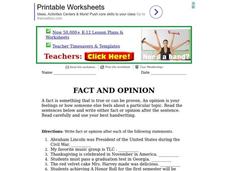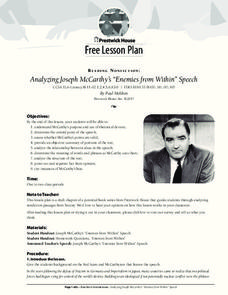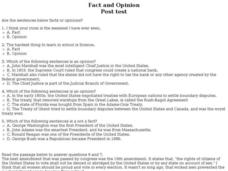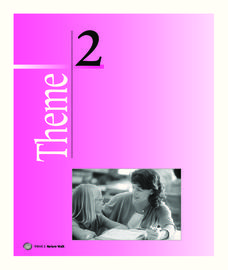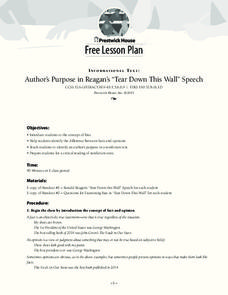Curated OER
Fact and Opinion
In this fact and opinion worksheet, students review the difference between fact and opinion and then identify 10 sentences as either fact or opinion.
Curated OER
Locating Facts and Opinions in a Newspaper
Fourth graders discuss the difference between fact and opinion. In this language arts lesson, 4th graders search the newspaper and identify factual articles and opinion based articles. Students discuss what makes the article factual or...
Prestwick House
Reading Nonfiction: Analyzing Joseph McCarthy's "Enemies from Within" Speech
Looking for a lesson that teaches class members how to analyze nonfiction? Use Joseph McCarthy's famous "Enemies from Within" speech as a instructional text. Worksheet questions direct readers' attention to the many historical...
DePaul University
Chicago Changes
Scholars determine statements as fact or opinion in a practice page consisting of two reading passages followed by multiple choice and short answer questions. Fact and opinion passages detail information about Chicago and Ethiopia.
Nasher Museum of Art at Duke University
Are You My Mother? An Opinion Writing Unit
During a five-day lesson, scholars analyze written and visual art—primarily the poem, Mother to Son by Langston Hughes— identify facts, and write opinions. Learners read the poem several times, discuss, write, compare and...
EngageNY
Identifying Author’s Opinion and Evidence: The Value of Sports in People’s Lives, Part II
Context matters! Using the intuitive resource, pupils decipher context clues to determine the meaning of unknown words from an informational text. Also, in small groups, they practice identifying the author's opinion and supporting...
Curated OER
Fact and Opinion: Post Test
In this fact and opinion worksheet, students identify sentences as being facts or opinions or choose the fact or opinion sentence. Students complete 10 multiple choice questions.
Curated OER
A Way with Words
How do facts and opinions impact the news? After reading "How to Cover a War" from the New York Times, middle schoolers evaluate the claims in the article. They also consider the media's responsibilities in reporting during wartime....
Curated OER
Creature Feature Poetry Keyword Search!
Students examine the differences between fact and opinion, and brainstorm ideas for a keyword list by analyzing facts. They listen to poems, and create posters listing three keywords about each creature featured in the poetry.
Curated OER
Distinguishing Facts from Opinions
Third graders use a scavenger hunt worksheet to look through classroom books and resources and identify facts and opinions. In this fact and opinion lesson plan, 3rd graders look through non fiction and fiction books.
Curated OER
Reading Comprehension
After listening to a story learners engage in a kinesthetic activity to answer comprehension and critical thinking questions. Finally, the students identify three main facts about the story. Extensions include a fact and opinion...
Curated OER
Fact and Opinion 3: Post Test
In this fact and opinion worksheet, students answer multiple choice questions about facts and opinions where they identify sentences and identify facts or opinions. Students complete 10 multiple choice questions.
Newseum
Weighing the Arguments
To understand how personal perspectives can affect policy and politics, scholars examine the woman suffrage media map and historical artifacts to analyze arguments for and against women's suffrage. Class members then take on the role of...
Houghton Mifflin Harcourt
Nature Walk: Extra Support Lessons (Theme 2)
Reinforce concepts such as long vowels, spelling patterns, sound clusters, double-final consonants, and syllables with a nature-themed unit. Through a series of extra support lessons, learners compare and contrast using a...
Curated OER
That Is Not My Opinion!
Being an informed citizen requires distinguishing fact from opinion and understanding persuasion methods. Secondary learners evaluate newspaper editorials. They read opinion pieces, identify the writer's purpose and position on an issue,...
Curated OER
Fact vs. Opinion
Young scholars explore fact versus opinion in reading material. They listen to sentences and use hand signals to identify if the sentences are facts or opinions. After reading a story, they vote on sentences for facts and opinions and...
Curated OER
Determining Author's Point of View: The Sneeches
Determine the author's point of view in a text. Young readers read Dr. Seuss' The Sneeches and identify the author's purpose in the story. They identify persuasive techniques in writing, asking and answering questions to better...
Curated OER
Form an Opinion Based on Facts
Explore fact and opinion through higher level thinking and literacy. Kids listen to the beginning of A Picture Book of Helen Keller by David A. Adler and identify facts in the text. They follow along as the teacher models how to form an...
Curated OER
Identifying Facts
Pupils evaluate what a fact is and what the characteristics of a fact are. In this fact and opinion lesson, students read through chapters in their books and point out facts that they find that cannot be disputed.
Curated OER
CHRISTMAS FILM REVIEW
Students write reviews of films they have seen over the Christmas holidays. They study what the ingredients of a film review are, and examine the difference between fact and opinion.
Curated OER
Fact
Students read about polar bears and discuss and identify the facts they learn about them. In this facts lesson plan, students explain why their facts are not opinions.
Curated OER
Discussing Non-Fiction Texts
Discuss non-fiction texts and fact and opinion. Learners discuss the features of non-fiction text, identify how to distinguish fact from opinion, and list ways to display information, including graphs, charts, and diagrams. While this is...
Curated OER
Is That a Fact?
Students write examples of facts and opinions on the board. In groups, they develop their own definitions for facts and opinions and share with the class. In new groups, they complete a worksheet in which they place statements into the...
Prestwick House
Author’s Purpose in Reagan’s “Tear Down This Wall” Speech
President Ronald Reagan's "Tear Down This Wall" speech, delivered on June 12, 1987 before the Berlin Wall, provides class members with an opportunity to examine three key aspects of informational text: author bias, the use of facts and...


